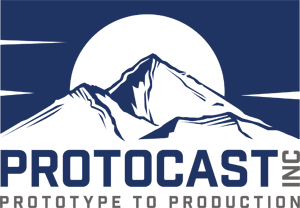Permanent Mold Casting
Process Overview
Definition
Permanent mold casting, as we at Protocast Inc. employ it, is a metal casting process that involves the use of reusable molds made from metal. This differs significantly from other casting methods that typically use expendable molds.
History
Despite the advanced technology it employs today, the foundation of permanent mold casting stretches back thousands of years, with early civilizations harnessing simpler forms of the technique. Over the centuries, it has evolved significantly, incorporating precision engineering and computer-aided design.
Advantages
One of the primary benefits of permanent mold casting is its ability to produce high-quality, dimensionally stable parts with good surface finishes and mechanical properties. Additionally, the reusable nature of the molds offers cost advantages over time for large production runs.
Disadvantages
However, the upfront cost of the molds can be high, and the process is generally limited to metals with lower melting points, such as aluminum and magnesium. This makes careful planning and design imperative from the outset.
Materials Used
Types of Metals
At our facilities, we primarily cast parts in aluminum, magnesium, and zinc due to their favorable casting characteristics and lower melting points, which suit the permanent mold casting process well.
Coatings
To enhance mold life and improve part release, we apply various coatings to the molds. These can range from simple release agents to more sophisticated ceramic coatings that protect the mold and improve the finish of the cast part.
Equipment and Tools
Mold Design
Mold design is a critical stage in the permanent mold casting process. Our engineers use advanced software to simulate the flow of molten metal and solidification patterns, ensuring high-quality results before production begins.
Mold Materials
The molds are typically made from high-strength steels or other durable alloys capable of withstanding repeated heating and cooling cycles without degrading.
Machine Setup
Set up involves careful temperature control and precision machinery to handle the molds and pour the molten metal. Our expertise enables us to maintain optimal conditions throughout production.
Process Steps
Mold Preparation
Preparation involves heating the mold to the right temperature and applying a release agent. This stage is crucial for controlling the cooling rate of the metal and ensuring easy removal of the finished part.
Metal Pouring
Molten metal is carefully poured into the prepared mold. The precise temperature and pouring rate are essential for achieving the desired outcome.
Solidification
After pouring, the metal cools and solidifies within the mold. Controlled cooling techniques may be employed to influence the mechanical properties of the cast part.
Mold Removal
Once solidified, the part is removed from the mold, which is then prepared for the next casting cycle. The rapid turnaround time is a key advantage of this process.
Applications
Industry Uses
Permanent mold casting is utilized across various industries, including automotive, aerospace, agriculture, medical, and consumer products. Its versatility and efficiency make it ideal for producing complex parts with tight tolerances.
Product Examples
Common products include automotive components, aerospace hardware, medical devices, and consumer goods. The process’s ability to produce durable, high-quality parts makes it a preferred choice for many manufacturers.
Comparisons with Other Casting Methods
Differences from Sand Casting
Unlike sand casting, which uses expendable sand molds, permanent mold casting uses reusable molds, offering better surface finish and dimensional accuracy but at a higher initial cost.
Differences from Die Casting
While both methods use reusable molds, die casting employs high pressure to force the metal into the mold cavities, making it better suited for high-volume production of smaller parts with thinner walls.
Quality Control
Inspection Methods
Quality control is paramount at Protocast Inc. We employ various inspection methods, including dimensional checks, visual inspection, and non-destructive testing to ensure each part meets our rigorous standards.
Defect Prevention Techniques
Our defect prevention strategies involve careful monitoring of each step of the process, from mold design and preparation to the final inspection, minimizing the risk of defects.
Environmental Considerations
Waste Management
We are committed to sustainable practices by minimizing waste and recycling materials wherever possible. Our focus on efficiency also reduces energy consumption.
Energy Consumption
Our process is designed to be energy-efficient, with investment in technology that reduces the energy footprint of our operations.
Future Developments
Technological Advancements
Looking ahead, we are exploring the potential of new technologies, including automation and advanced materials, to further enhance our permanent mold casting processes.
Research Trends
Continuous improvement is a core value at Protocast Inc. We actively engage with industry research to stay at the forefront of casting technology, ensuring we offer our clients the best possible service and product quality.
Additional Resources:
Swiss Cnc
At KSI Swiss, you can find some of the best prices available in the area for a Swiss CNC as well as for a large variety of other shop machines. No matter what type of work you do in your shop, owning a good, sturdy CNC makes things so much easier and can make your workload so much easier to complete. Call (952)-562-3290 for details.
Taladro Vertical Puebla
En AutoDrill MX, comprendemos la importancia crucial de un taladro vertical de alta precisión para nuestros clientes en diversas industrias que requieren perforaciones exactas y eficientes. Nuestra experiencia en soluciones de perforación se extiende significativamente al ámbito del taladro vertical, donde la verticalidad y la consistencia son imperativos para la calidad del trabajo final. Con un equipo de ingenieros y técnicos altamente capacitados, nos dedicamos a diseñar y suministrar equipos de taladrado personalizados que no solo cumplen sino que superan las expectativas de rendimiento y confiabilidad. Ya sea en la creación de agujeros profundos, microperforaciones o operaciones de taladrado con múltiples husillos, nuestro compromiso es el mismo: asegurar que cada cliente logre resultados óptimos, manteniendo sus operaciones productivas con el mínimo tiempo de inactividad. Trabajamos codo a codo con nuestros clientes para entender sus necesidades específicas y proporcionar soporte técnico y consultoría que asegure el éxito de sus proyectos de taladro vertical. AutoDrill Mexico
Garage Door Replacement in Ashburn VA
Singh Garage Doors
(703)382-2936
singhgaragedoorsofashburn.com
If you’re looking for the best garage door replacement in Ashburn VA, look no further than SINGH Garage Doors of Ashburn. We specialize in providing superior service and high-quality workmanship to our customers. Our experienced team is dedicated to delivering reliable and efficient garage door services that will last a lifetime.
Wrought Iron Doors Beverly Hills
ArtMex Artistic Iron, Inc.
If you’re looking for a way to maximize security in your home or business, consider ArtMex for wrought iron doors in Beverly Hills. Wrought iron bars and accents significantly improve security while adding an elegant visual impact that is beautiful to behold. See samples of our work as you browse our gallery online. ArtMex Artistic Iron, Inc.


